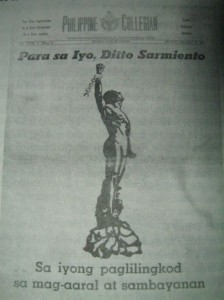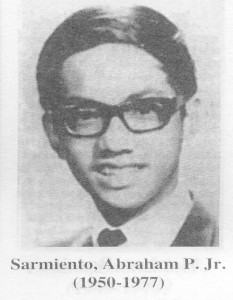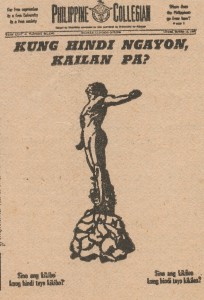Manny Pangilinan and UP Diliman’s naked man
SAN FRANCISCO — In giving the University of the Philippines five million pesos, Manny Pangilinan was quoted by Interaksyon.com as saying, “I’ve always been intrigued by that big school in Diliman, lying behind that naked man with outstretched arms.”
Money has long been a problem for my alma mater, so it’s certainly great news that Diliman just got the endorsement of someone who has plenty of it.
Basketball apparently was a key focus of Pangilinan’s generosity. He noted at the Alpha Sigma gathering that UP last won a national title in 1986. That brought back memories for me. For I was there that afternoon when UP won, and even joined the crowd in rushing to the court at Ultra to celebrate.
Of course, UP has since struggled though Pangilinan also marveled at how well the school has dealt with a losing streak, praising what he called “the never die attitude of the community. “Natatalo na, ang yayabang pa. Hindi na nga sumampa sa finals, lamang pa sila sa alaskahan.”
He even took note of how T-shirts commemorating UP’s 1986 triumph are still on sale quipping “Labhan ninyo na iyan.”
And why does UP keep losing? His theory: Maybe because UP students simply spend too much time protesting. “Napagod siguro kaka-rally.”
It’s a good sign that Pangilinan is kicking off his new relationship with my beloved UP with a sense of humor and even some acknowledgment of the school’s reputation.
He would probably even be intrigued by what Diliman’s naked man, best known as the Oblation, represents.
Most UP alums know its story.
National Artist Guillermo Tolentino created the statue which he said “symbolizes all the unknown heroes who fell during the night.” The sculpture, he said, was inspired by a stanza in Jose Rizal’s Mi Ultimo Adios:
“In field of battle, delirious fighting,
Others give you their lives, without doubt, without regret …”
It’s a fitting symbol for a university known for fighters. In fact, the UP student as rebel has become almost a cliché.
That tradition got plenty of attention recently with a series of September anniversaries related to martial law and Lean Alejandro, the former chairman of the UP Student Council who was assassinated 25 years ago. In fact, September also marked the 30th anniversary of the martyrdom of Edgar Jopson, who is known mainly as an Atenista but who also went to UP as a law student before joining the anti-Marcos resistance.
Pangilinan’s remark about the Oblation actually reminded me of another upcoming anniversary which I also hope gets much attention.
November 11 will mark the 35th anniversary of the death Abraham ‘Ditto’ Sarmiento. He was the former editor of the UP Collegian who died after he was thrown in prison for speaking out against the Marcos dictatorship.
In fact, his death anniversary takes on additional significance given the ongoing battle over free speech, sparked by the controversial anti-cybercrime law.
Sarmiento took over the Collegian at a time when press freedom and freedom of speech were under siege under Marcos. In fact, during those years, the Collegian stood out as the lone voice of dissent.
And that cost Sarmiento his life.
He became known for scathing editorials against the regime. One published in early 1976 argued that “the time has come for us to take action and not lie silently about as our rights increasingly become trampled upon. The time is now, for if not now, when?”
His words later became UP’s famous battle cry: “Kung Hindi Tayo Kikibo, Sinong Kikibo? Kung Di Tayo Kikilos, Sinong Kikilos? Kung Hindi Ngayon, Kailan Pa?”

From ‘Six Young Filipino Martyrs edited by Asuncion David Maramba’. Photo from Dante Ambrosio and Xiao Chua Archives
The naked man that Pangilinan referred to in his remarks even played an important role in Ditto Sarmiento’s story of courage of defiance. One edition of the Collegian during Sarmiento’s term featured an image of the Oblation with the words emblazoned on top: “Kung hindi ngayon kailan pa?”
Eventually, Marcos lost patience with such acts of defiance. Sarmiento was arrested in late January 1976.
One thing has to be stressed here: This was the time before Facebook, Twitter and the Web. Sarmiento did not have followers in cyberspace that could rally support for him.
He could rely on very little support from his family and others opposed to the regime. He was from a prominent middle class family (his father was lawyer and opposition leader Abraham Sarmiento who would later serve as a supreme court justice ), but even that did not protect him at a time when the likes of Ninoy Aquino and Pepe Diokno were thrown in prison without due process.
Speaking out was a very risky thing to do back then. And Ditto Sarmiento paid the price for daring to do so.
He spent eight months in prison. The inhumane conditions aggravated his already frail health. Sarmiento never fully recovered from the experience. He died in November 1977. He was 27.
Manny Pangilinan may actually have seen yet another famous U.P. T-shirt. It had nothing to do with basketball. Instead, it was about the young, daring editor of the UP Collegian.
To honor their fallen editor, the Collegian ran a special edition of the paper in 1977. Emblazoned on the cover were the words: “Para sa iyo, Ditto Sarmiento, sa iyong paglilingkod sa mag-aaral at sambayanan.” Again, they used the image of the Oblation.
But instead of his arms outstretched, Diliman’s naked man has his fist raised to the sky, having broken free from chains.
Follow on Twitter @BoyingPimentel. Subscribe on Facebook at www.facebook.com/benjamin.pimentel

